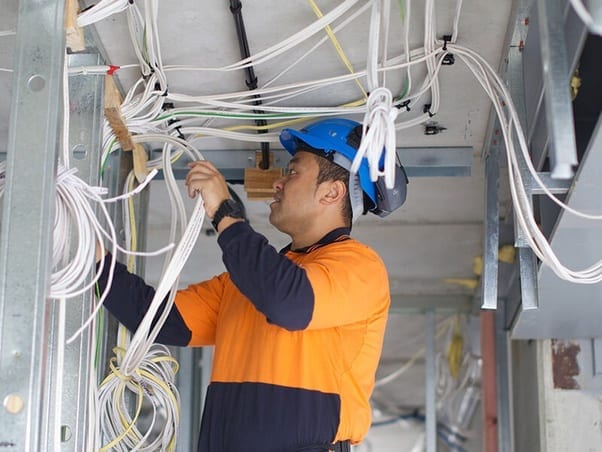
Verifying an Electrician: A Key Step Towards Ensuring Electrical Safety and Workmanship
In an era where DIY projects are popular and YouTube tutorials are abundant, handling electrical work stands out as a task that often requires professional hands. The stakes involving electricity are incredibly high; a minor mishap can culminate in significant damage, or even catastrophic outcomes like electrical fires. As such, when it comes to any electrical work—be it an installation, repair, or upgrade—hiring a certified and reliable electrician is imperative. This blog will delve into the comprehensive guide on verifying an electrician before entrusting them with your projects and understanding the paramountcy of this step.
The Importance of Verifying an Electrician
Electricity is not forgiving; a small mistake can be fatal or result in severe property damage. As per the Electrical Safety Foundation International, electrical failures or malfunctions are a substantial ignition factor for fires in residential buildings. The importance of ensuring that the individuals tasked with handling this potent energy source are adequately qualified cannot be overstated.
- Safety Assurance: A verified electrician is trained to handle electricity safely, mitigating the risk of accidents during the project.
- Quality Workmanship: Ensuring the electrician’s authenticity and competence likely guarantees that the electrical work will comply with the set standards and be of superior quality.
- Accountability: Verified electricians are usually licensed and insured, meaning that in the rare case of an unforeseen incident, there’s a means of accountability and potential compensation.
- Regulatory Compliance: Adherence to building codes and regulations is crucial in electrical work to prevent legal complications. An accredited electrician is conversant with these regulations and ensures compliance.




Steps to Verify an Electrician
- Check for Licensure
Ensure that the electrician is licensed to operate in your state or locality. A licensed electrician indicates that they have undergone the necessary training and examinations to perform electrical work. It also signifies adherence to local codes and regulations. You may validate their license number through your state’s regulatory board of electricians or an equivalent body.
- Verify Insurance
Ensure that the electrician has appropriate insurance. This safeguards you from potential liabilities, such as injuries or damages that may occur during the project. You can validate insurance details by contacting the insurance provider.
- Seek References and Reviews
Direct references from friends or family can be incredibly valuable. Alternatively, delve into online reviews and testimonials. Pay attention to patterns, whether positive or negative. If possible, contact past clients to understand their experiences.
- Check Experience and Specializations
Ensure that the electrician has experience relevant to your project. Electricians might have various specializations, such as residential, commercial, or industrial electrical work. Choose one who aligns with your project type.
- Validate Certification
Check if the electrician has any additional certifications from recognized professional bodies. This may indicate a commitment to continuous learning and adherence to best practices within the industry.
- Obtain and Compare Quotes
Attain detailed quotes and ensure they encompass all aspects of the project. This includes labor, materials, and any other ancillary costs. Compare quotes from different electricians, not just in terms of cost, but also considering other factors like experience and reviews.
- Communication and Professionalism
Gauge the electrician’s professionalism and communication efficiency during your interactions. A professional electrician will be transparent, punctual, and willing to answer your queries.
The procedure of verifying an electrician may seem like an intricate task, yet it is a vital endeavor that could shield you from monetary loss and enhance safety. While it adds an additional step to your project planning, considering the potential repercussions of substandard electrical work underscores its importance. With the right electrician, not only do you secure peace of mind, but you also invest in the durable, safe, and proficient execution of your electrical projects. This assurance of safety and quality underscores why verification is not just a step but a necessity in choosing an electrician.




Prolonged Impact: The Lifelong Benefits of Meticulous Verification
Choosing the right electrician not only impacts the immediate safety and quality of the work but also has a profound effect on the long-term safety and functionality of your electrical system. The electrical infrastructure within a property is akin to the nervous system of a body; when wired correctly, everything runs smoothly, but when mismanaged, the entire structure can experience difficulties.
Reducing Future Costs
Proper electrical work, installed and maintained by a verified electrician, can significantly minimize the likelihood of future issues, thereby reducing potential costs linked with repairs, replacements, or damage recovery.
Improving Property Value
High-quality electrical work, guaranteed by hiring a verified electrician, can enhance the value of your property. Whether it’s a home or a business space, reliable and safe electrical installations are a valuable asset, especially in the real estate market.
Adhering to Sustainability Goals
In an age of increased environmental awareness, ensuring that your electrical systems are installed and maintained efficiently by a verified professional can contribute to minimizing your energy usage, aligning with broader sustainability goals.



Tips for Continuous Electrical Safety and Efficiency
Once your verified electrician has successfully completed the project, the following measures can help you maintain the safety and efficiency of your electrical system:
- Routine Check-Ups: Regularly have your electrical systems assessed by a professional to catch any potential issues early.
- Upgrade When Necessary: Be mindful of the lifespan of your electrical systems and consider upgrades when applicable to adhere to current standards and technologies.
- Educate and Be Mindful: Ensure all occupants of the property understand the basics of electrical safety to prevent mishaps.
- Stay Informed: Keep abreast of any changes in local regulations or new technologies that could impact or enhance your electrical systems.
Build a Relationship for Future Needs
Lastly, establishing a solid working relationship with a trusted, verified electrician can be incredibly beneficial for future needs. This professional will already be familiar with your property’s electrical system, making it easier and potentially more cost-effective for any future work. If your electrician did a commendable job, ensure to retain their contact information and do not hesitate to provide them with genuine reviews online or recommend them within your network.
Verification of an electrician is not merely a step in the hiring process; it is an investment in safety, quality, and durability of electrical work in your property. By being scrupulous in your selection process, you not only safeguard your immediate project but ensure that the electrical veins running through your property are robust, reliable, and poised to serve you effectively in the long run. The time spent ensuring your electrician is credible, knowledgeable, and experienced is time invested in constructing a safe and stable environment, whether it be a home or a workplace.


Navigating Safe Electrical Work: Professionals vs. DIY
The do-it-yourself (DIY) trend has been exponentially growing, encouraged by a multitude of online tutorials and a collective push towards self-sufficiency. While this can be effective and economical for various home projects, when it comes to electrical work, the stakes are substantially higher.
Safety First: The Paramount Reason to Choose Professional Services
- Risk of Electrocution: The most blatant danger in managing electrical work without professional expertise is the risk of electrocution. Navigating through wires without precise knowledge can expose individuals to serious injury or even fatal accidents.
- Fire Hazards: Incorrect wiring or mismanagement of electrical components can create latent fire hazards. An unnoticed mistake could lead to short circuits, sparking, and eventual fires, endangering lives and property.
- Legal Implications: In many jurisdictions, electrical work is mandated to be conducted or overseen by licensed professionals to maintain safety standards. Unauthorized electrical work could lead to legal ramifications, hefty fines, or invalidate your home insurance.
Long-term Security: Ensuring Stability Beyond the Immediate Fix
- Durability: Professional electricians not only address the immediate issue but also foresee future problems or requirements. Their experience and training allow them to execute work that will stand the test of time, mitigating the need for frequent interventions.
- Peace of Mind: Knowing that your electrical system has been managed by a professional ensures that you, and potentially future occupants of the space, can utilize electrical components without underlying concerns about safety or reliability.
- Warranty and Accountability: Hiring a reputable electrician often comes with the assurance of quality and a warranty on the work. If issues arise post-service, professionals are typically obliged to rectify them, providing an additional layer of security.
Efficient and Economical: Debunking the Myth of Saving Money Through DIY
- Avoiding Additional Costs: Faulty DIY electrical work may cause problems that can become hefty financial burdens in the future. Conversely, a professional will get it right the first time, negating the possibility of incurring additional costs for corrections.
- Saving Time: Electricians come with the knowledge, experience, and tools to get the job done efficiently. What might take a non-professional several hours (or days) to figure out, a professional might accomplish in significantly less time.
- Resale Value: Professional electrical work maintains and can even enhance the value of your property. Prospective buyers are likely to invest in a property with secure and professionally managed electrical systems.
While it might be tempting to attempt electrical work on your own, especially with a plethora of resources available online, it is crucial to recognize the value, security, and long-term benefits that come with hiring a professional electrician. The assurances of safety, legality, and quality work provide a robust argument against undertaking electrical projects as DIY. While you protect your home from possible mishaps related to electrical work, you’re also ensuring the safety of those within it, affirming that when it comes to electricity, the professional route is, unequivocally, the brightest choice.




Understanding Electrician Certifications and Qualifications
The realm of electrical work isn’t just about dealing with wires and circuits; it encompasses a vast field of knowledge and skills that are pivotal in ensuring the safety and efficacy of electrical installations and repairs. Hiring a certified and qualified electrician isn’t just a wise choice; it’s an imperative one, considering the high stakes involved in electrical work. Let’s delve deeper into the multifaceted world of electrician certifications and qualifications.
Why Certifications Matter
Certifications are not mere pieces of paper but are testament to an electrician’s dedication to adhering to national and local standards. They validate that an electrician has undergone rigorous training, accumulated requisite hands-on experience, and passed stringent exams to validate their skills and knowledge. Moreover, being certified ensures that they are up-to-date with the latest technologies, methodologies, and safety protocols in electrical work.
Types of Certifications
1. Journeyman Electrician
Journeymen electricians are typically certified to undertake a myriad of electrical tasks but are not yet qualified to design electrical systems. They often work under a master electrician and can handle installations, repairs, and replacements but might be restricted from performing more complex tasks that require detailed electrical system planning.
2. Master Electrician
Master electricians have advanced through additional years of experience and education, qualifying them to work on all types of electrical systems, including designing new systems. They can manage larger projects, supervise journeymen and apprentice electricians, and ensure that all electrical work aligns with regulatory standards and codes.
3. Residential Electrician
A certified residential electrician is specialized in installing, repairing, and maintaining electrical systems in homes and other residential properties. While their scope might be considered narrower than that of a general electrician, their specialization equips them with a fine-tuned skill set optimized for residential work.
4. Commercial Electrician
Commercial electricians, on the other hand, specialize in working on larger-scale projects in commercial properties like offices, malls, and industrial buildings. Their work often involves high-voltage systems and more complex, large-scale installations or maintenance.




Qualification Requirements
The path to becoming a certified electrician often begins with an apprenticeship, where aspiring electricians acquire hands-on experience under the tutelage of seasoned professionals. Subsequently, they progress to become a journeyman through examinations and accumulating a specific number of work hours. Becoming a master electrician requires additional years of experience and another round of examinations.
Understanding Job-Specific Needs
When selecting an electrician, understanding the scope and specifics of your project is paramount.
- For Home Projects: A residential electrician or a journeyman might be apt, depending on the complexity of the work.
- Large-Scale Installations: A master electrician would be more suited for designing and implementing large-scale electrical systems, especially in commercial buildings.
- Repairs and Maintenance: While most certified electricians can handle general repairs, ensuring they have specific experience in dealing with particular types of issues or systems is crucial.
An electrician’s certifications and qualifications act as a roadmap to their expertise and capability. It is essential to align their certification level and specialization with the specific requirements of your project, ensuring that they are more than just qualified – they are the right fit for your electrical needs.
As you navigate through the process of selecting an electrician, prioritize a balanced perspective, focusing not just on their certifications, but also on their experience, reviews, and ability to effectively communicate and understand your requirements. After all, a harmonious blend of certified skills and customer-oriented service culminates in electrical work that is not only safe and reliable but also tailored to meet and exceed your expectations.



The Insurance Aspect: Ensuring Your Electrician is Insured
Navigating through the intricate and vital world of electrical work can often pose unseen challenges and potential risks. The foundational wiring and electrical systems that invisibly weave through our buildings are tantamount to our daily functionalities, making it imperative to approach electrical work with astute caution and due diligence. One critical component that demands attention in this regard is the insurance aspect of hiring an electrician, a topic that extends its significance beyond mere formalities and embeds itself as a safeguarding pillar in the hiring process.
The Significance of Hiring an Insured Electrician
When we dive into the intricacies of electrical work, the potential risks – both physical and financial – emerge with a clear and present need for mitigation strategies. Hiring an insured electrician isn’t just a procedural checkpoint; it’s a crucial step in safeguarding interests on both ends of the spectrum: the client and the electrician.
- Financial Safety Net: Accidents or unexpected incidents during electrical work, such as damage to the property or electrical systems, can result in unanticipated financial burdens. An insured electrician provides a financial safety net, ensuring that you, as a client, are not lumbered with unforeseen costs resulting from such mishaps.
- Legal Compliance: In various regions and states, hiring an insured electrician is not just recommended but is mandated by law. Engaging with an electrician who is compliant with local legal requirements ensures that your project adheres to regulatory standards and avoids potential legal entanglements.
- Risk Mitigation: Electrical work comes with its set of inherent risks. Ensuring that the electrician is insured mitigates the risk of liabilities being transferred to you should an accident occur on your property.


How Insurance Protects During Electrical Work
For the Electrician
- Worker’s Compensation: In the unfortunate event of an accident or injury during the project, insurance provides a buffer against medical costs and loss of income for the electrician or their team members.
- Liability Coverage: If an electrician accidentally causes damage to the client’s property, liability insurance protects them from facing the brunt of the financial burden by covering repair or replacement costs.
For the Client
- Property Protection: Should your property incur damages as a direct result of the electrical work, the electrician’s insurance guarantees that you are not left financially stranded, providing coverage for the necessary repairs or replacements.
- Avoiding Liability: If an accident occurs on your property during the electrical work, having an insured electrician ensures that you are not held liable for medical or other associated costs.
Verification and Assurance
When hiring an electrician, it is imperative to not just take their insurance status at face value. Engage in due diligence by:
- Requesting proof of insurance and verifying its validity.
- Checking the coverage extent of the insurance to ensure it aligns with your project’s scope and scale.
- Understanding the terms of the insurance to ensure clarity and avoid future misunderstandings.
The decision to ensure that your hired electrician is insured intertwines with the strands of financial prudence, legal compliance, and risk management. It safeguards you from potential financial and legal repercussions while also providing a safety net for the electrician, thereby creating a conducive environment where the focus remains firmly rooted in quality, safety, and efficacy of the electrical work undertaken.
As electrical currents invisibly power our world, let the assurance of insurance invisibly weave a safety net around your electrical projects, illuminating them with the light of security, compliance, and peace of mind.




Ensuring Accurate Quotes with a Trusted Electrician
The financial aspect of undertaking electrical work, whether it involves repair, installation, or an upgrade, demands careful consideration and prudent decision-making. Beyond the evident financial allocation, it directly links to the hiring of a trusted and reliable electrician – a professional whose quotes you can rely on to be transparent, fair, and reflective of the market standards. Let’s illuminate the multifaceted importance and interplay of hiring a trusted electrician, focusing on financial aspects and accurate quoting.
The Interplay of Trust and Financial Transparency
In a market where varied pricing models and diverse service charges are rampant, navigating through the myriad of electricians and their respective quotes can be an intricate endeavor. Hiring an electrician whose reputation and past work vouch for their trustworthiness establishes a foundation where:
- Transparency Prevails: A trusted electrician will provide transparent quotes, breaking down costs in a manner that makes them comprehensible and justifiable.
- Hidden Charges are Avoided: The menace of hidden or unexplained costs is mitigated when working with a trusted electrician, ensuring that your budget isn’t unknowingly stretched beyond its limits.
How Trustworthy Electricians Offer Accurate Quotes
1. Detailed Inspection
Trusted electricians usually start with a comprehensive inspection to understand the scope of work, subsequently providing a quote that reflects the labor, materials, and any other costs involved accurately.
2. Experience and Knowledge
Their wealth of experience enables them to accurately estimate costs and potential challenges, preventing unexpected expenses popping up in the middle of the project.
3. Ethical Practices
They prioritize ethical practices, offering a quote that is fair, competitive, and reflective of the market, rather than capitalizing on a client’s lack of electrical knowledge.




Basis of Costs for Common Electrical Problems
While the actual costs can significantly vary due to regional pricing, scope, and specific electrician charges, here is a generalized breakdown:
- Faulty Wiring Repair: Repairing faulty wiring can cost anywhere between $150 to $500, dependent on the extent and location of the wiring.
- Circuit Breaker Replacement: Expect to pay approximately $150 to $200 for a standard circuit breaker replacement.
- Outlet Installation: The cost for new outlet installation typically ranges from $100 to $200 per outlet, with variations based on type and location.
- Light Fixture Installation: Depending on the complexity and type of the fixture, installation can range from $150 to $700.
It’s pivotal to note that these are generalized costs and actual quotes may vary. It’s also essential to consider that higher-end or specialized services and parts may accrue additional costs.
The Convergence of Quality and Cost
Navigating through the cost and quality paradigm, especially in a field as specialized and nuanced as electrical work, brings forth the importance of a balanced approach. Hiring a trusted electrician, one whose quotes are as reliable as their service, intertwines the paths of quality work and financial judiciousness.
Moreover, this trusted relationship ensures not only the safeguarding of your financial resources but also the safety and longevity of the electrical work undertaken. Thus, the interplay of trust and accurate quoting unfolds its wings, casting a shadow of reliability and ethical practice over the electrical project, ensuring it is illuminated with fairness, transparency, and exemplary work quality.
As we harness the invisible power of electricity to brighten our spaces, let us ensure that the path it flows through is crafted with trust, expertise, and a financial understanding that lights up not just our surroundings, but also our peace of mind and trust in professional ethics.


Leave a Reply